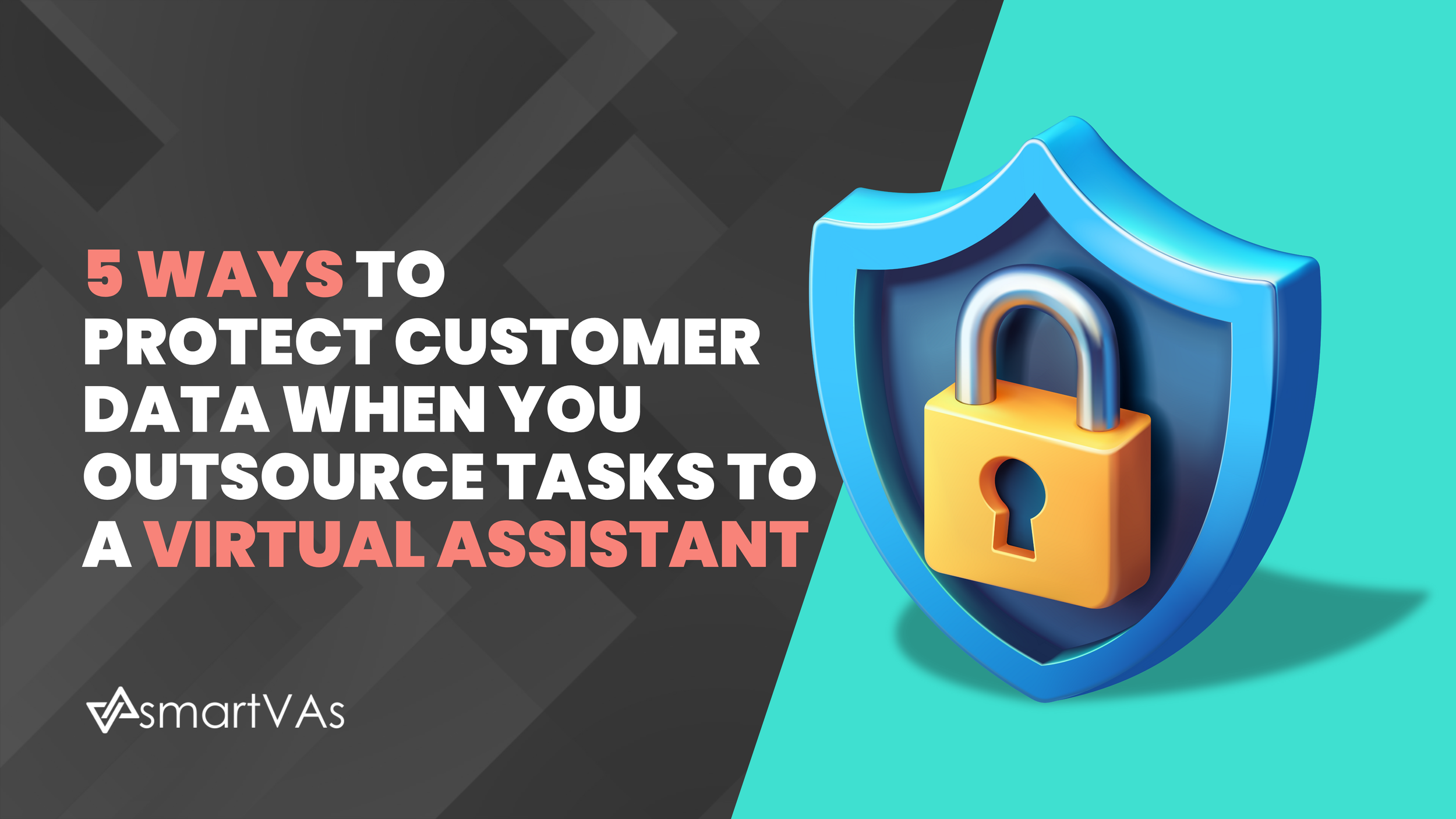5 Ways to Protect Customer Data When You Outsource Tasks to a Virtual Assistant
Hiring a virtual assistant can feel like a superpower. Suddenly, you’re offloading invoices, social posts, and research so you can focus on growth. But handing over responsibilities also means sharing access to customer information.
That’s where the hesitation kicks in. Sending passwords or client data across the world feels risky—and for good reason. Data breaches are costly, and regulators are stricter than ever. In 2024 alone, GDPR fines topped €1.2 billion. Protecting customer information isn’t just a legal duty; it’s about keeping trust intact and avoiding expensive fallout.
Trust, once broken, is tough to repair. And since VAs often work with sensitive details, clear systems and boundaries are essential.
Sounds too much? It doesn’t have to be. The tips below will help you collaborate smoothly with VAs while keeping customer information safe.
Related Topic: We hire and retain 5-star virtual assistants!
Set Up Secure Systems and Clear Boundaries
One mistake many entrepreneurs make is handing over their login details and hoping for the best. Instead, create a structured handoff:
Use password managers. Tools like LastPass or 1Password let you share credentials without exposing the actual password. If you need to revoke access later, it takes seconds.
Assign role‑based permissions. Don’t give your VA administrator rights if they only need to edit blog posts. Most platforms offer tiered access so helpers can do their job without seeing complete customer databases.
Outline allowed tasks and data limits. In onboarding documents, specify what types of information the assistant can collect (e.g., email addresses) and what’s off‑limits (e.g., credit‑card details).
When you’ve set clear boundaries, you reduce the risk of unintended data collection. It also makes performance easier to measure.
Build Trust Through Transparent Landing Pages
Privacy concerns don’t end behind the scenes; they extend to the website where customers interact with your brand. Many entrepreneurs ask virtual assistants to create or update landing pages. To maintain compliance with data protection regulations, ensure these pages include certain features:
● Clear opt‑in mechanisms. Every form should make it obvious what visitors are signing up for. Don’t pre‑check boxes or hide consent in lengthy paragraphs.
● Plain‑language privacy explanations. Briefly describe how the visitor’s data will be used and link to a full policy. This helps comply with regulations like the EU’s GDPR and California’s CCPA.
● Cookie consent banners. If your site uses cookies to track behavior or serve ads, visitors should be able to accept or decline.
● Links to privacy policy and data management tools. Give people an easy way to manage their settings or request deletion of their data.
A comprehensive guide like VSSL Agency’s resource on landing page compliance explains these elements in detail. Sharing it with your VA ensures everyone is on the same page about legal requirements and user expectations. Including compliance badges or seals on your page can also reassure visitors that you take their privacy seriously.
Train Your VA on Privacy Basics
Technical protections are only part of the equation; people need to understand why they matter. During onboarding:
● Review data protection regulations. Explain key concepts like consent, data minimisation, and the right to be forgotten. Mention how non‑compliance led to significant fines for companies such as Meta, which faced a record €1.2 billion penalty.
● Discuss phishing and social‑engineering risks. Virtual assistants should know how to spot suspicious emails or messages that attempt to trick them into disclosing credentials.
● Encourage questions. A culture of openness makes it easier to address grey areas.
You don’t need to make every assistant a legal expert, but they should appreciate the consequences of careless data handling. Consider offering a short compliance quiz or refresher sessions to reinforce concepts.
Use Analytics Wisely Without Over‑collecting
Numbers drive decisions, whether you’re measuring website traffic or tracking email open rates. Do you know? 2023 State of Marketing reported that more than one in three marketing leaders cite conversion rates as a top KPI, yet nearly two out of three marketers report their average landing page conversion rate is under 10 %. Improving those numbers often means experimenting with design, copy, and offers, but not at the expense of visitor privacy.
● Avoid collecting unnecessary fields. If you want newsletter sign‑ups, ask for an email address and maybe a first name; skip phone numbers unless needed.
● Aggregate your data. Look at trends rather than trying to build detailed profiles of individual visitors.
● Respect opt‑outs. Immediately remove contacts who request to be unsubscribed or deleted from your system.
By balancing analytics with respect for personal data, you’ll learn what works without overstepping boundaries.
Related Topic: Conversion Rate
Wrap‑up
Outsourcing to a virtual assistant shouldn’t mean outsourcing responsibility. By setting up secure systems, training your team, and designing transparent landing pages, you can share the workload without risking customer trust. Compliance isn’t a one‑time task; it’s an ongoing practice that protects both your brand and your clients. Spend a few hours getting it right now, and you’ll save yourself countless headaches and possibly hefty fines later on.
Learn How Smart VAs Can Help: Our virtual assistant services are designed to take the weight off your shoulders while keeping compliance and customer trust at the forefront.
Frequently Asked Questions
-
Use password managers, encrypted communication channels, and assign role-based access so your VA only sees what they need.
-
Yes. A clear contract and non-disclosure agreement help protect your business data and set legal boundaries.
-
Tools like LastPass, Google Workspace, and project management software with permissions can help keep data secure and track VA activity.
-
Regular reviews—at least quarterly—ensure compliance and keep both you and your VA aligned with best practices.
-
Absolutely. With proper training, Smart VAs can take over compliance-related tasks like monitoring data handling, updating records, and ensuring systems meet standards.
Ready to Work Smarter, Not Harder?
Smart VAs provides a team of highly skilled specialists from around the world, ensuring seamless support no matter the time zone. We take pride in delivering efficient, fast, and high-quality service so you can focus on growing your business. With one subscription plan, you gain access to a complete team of digital marketing experts that’s customized to your unique needs, eliminating the need to train and look for one yourself!




